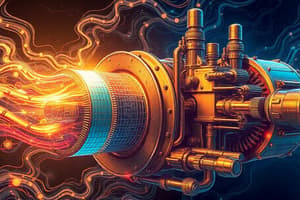Podcast
Questions and Answers
What is a primary focus of material science and engineering?
What is a primary focus of material science and engineering?
- Implementing project management techniques
- Designing electrical systems
- Creating algorithms for problem-solving
- Understanding the properties of materials (correct)
Which of the following represents a method commonly used in advanced manufacturing?
Which of the following represents a method commonly used in advanced manufacturing?
- Mechanical drafting
- 3D printing (correct)
- Quality assurance testing
- Structural analysis
What type of degree is typically required for entry-level mechanical engineering positions?
What type of degree is typically required for entry-level mechanical engineering positions?
- Bachelor's degree in mechanical engineering (correct)
- Certification in project management
- Associate's degree in science
- Doctoral degree in engineering
Which of these roles is commonly associated with mechanical engineers?
Which of these roles is commonly associated with mechanical engineers?
In mechanical engineering, why is interdisciplinary collaboration important?
In mechanical engineering, why is interdisciplinary collaboration important?
What is the primary focus of thermodynamics in mechanical engineering?
What is the primary focus of thermodynamics in mechanical engineering?
Which area of specialization in mechanical engineering focuses on the design of vehicles?
Which area of specialization in mechanical engineering focuses on the design of vehicles?
What is the purpose of using Computer-Aided Design (CAD) in mechanical engineering?
What is the purpose of using Computer-Aided Design (CAD) in mechanical engineering?
Which fundamental concept involves the study of fluid behavior, including pressure and flow?
Which fundamental concept involves the study of fluid behavior, including pressure and flow?
What role does prototyping play in the design process of mechanical engineering?
What role does prototyping play in the design process of mechanical engineering?
Which of the following best defines the mechanics of materials in mechanical engineering?
Which of the following best defines the mechanics of materials in mechanical engineering?
What is the focus of control systems in mechanical engineering?
What is the focus of control systems in mechanical engineering?
Which specialization in mechanical engineering involves the use of nanomaterials?
Which specialization in mechanical engineering involves the use of nanomaterials?
Flashcards
Computational Methods
Computational Methods
Utilizing mathematical models and algorithms to solve complex engineering problems. This involves using computer simulations to analyze and optimize designs.
Advanced Manufacturing
Advanced Manufacturing
Employing advanced techniques like additive manufacturing (3D printing) and CNC machining to create physical objects.
Career Opportunities in Mechanical Engineering
Career Opportunities in Mechanical Engineering
Mechanical engineers work in diverse industries like design, research, development, manufacturing, and maintenance.
Interdisciplinary Collaboration
Interdisciplinary Collaboration
Signup and view all the flashcards
Material Science and Engineering
Material Science and Engineering
Signup and view all the flashcards
Thermodynamics
Thermodynamics
Signup and view all the flashcards
Kinematics and Dynamics
Kinematics and Dynamics
Signup and view all the flashcards
Mechanical Engineering
Mechanical Engineering
Signup and view all the flashcards
Design Process
Design Process
Signup and view all the flashcards
Control Systems
Control Systems
Signup and view all the flashcards
Manufacturing Processes
Manufacturing Processes
Signup and view all the flashcards
Prototyping
Prototyping
Signup and view all the flashcards
Fluid Mechanics
Fluid Mechanics
Signup and view all the flashcards
Study Notes
Introduction to Mechanical Engineering
- Mechanical engineering designs, analyzes, manufactures, and maintains mechanical systems.
- It applies physics and mathematics to solve engineering problems.
- Mechanical engineers improve machine and system efficiency and performance.
Core Concepts
- Thermodynamics: Studies energy transformations, including heat, work, temperature, and entropy.
- Fluid Mechanics: Examines fluid (liquid and gas) behavior, including pressure, flow, and viscosity. Applications include pumps, pipelines, and aerodynamics.
- Mechanics of Materials: Analyzes material behavior under stress and strain, focusing on strength, stiffness, and deformation.
- Kinematics and Dynamics: Analyzes mechanical systems' motion, including velocity, acceleration, forces, and energy. Machine design depends on understanding motion and forces.
- Control Systems: Controls mechanical systems using sensors and actuators; used in automated machinery and robotics.
- Manufacturing Processes: Techniques for creating components from machining and casting to 3D printing.
Design and Analysis
- Design Process: A systematic solution-creation approach involving needs identification, brainstorming, prototyping, testing, and refinement.
- Computer-Aided Design (CAD): Creates and modifies 2D and 3D models for visualization, analysis, and manufacturing using software.
- Computer-Aided Engineering (CAE): Uses software for analysis tasks like stress analysis, fluid flow simulation, and heat transfer.
- Prototyping: Creates physical models to test ideas, analyze performance, and identify design flaws before manufacturing.
Areas of Specialization
- Automotive Engineering: Designs, develops, and tests vehicles.
- Aerospace Engineering: Designs and builds aircraft, spacecraft, and rockets.
- Robotics: Designs and builds robots and automated systems.
- Biomedical Engineering: Creates medical devices, prosthetics, and assistive technologies.
- Energy Systems: Designs and optimizes power generation, transmission, and distribution.
- Nanotechnology: Uses nanomaterials and nanodevices in mechanical systems.
Tools and Technologies
- Material Science and Engineering: Understands different materials' properties to choose the best for each application.
- Computational Methods: Utilizes mathematical models and algorithms to solve complex engineering problems.
- Advanced Manufacturing: Employs advanced techniques like additive manufacturing (3D printing) and CNC machining.
- Measurement and Instrumentation: Uses sophisticated tools for precise measurements and data acquisition.
Career Opportunities
- Mechanical engineers have diverse career paths in various industries.
- They work in design, research, development, manufacturing, and maintenance.
- Typical careers include mechanical design engineers, manufacturing engineers, and research engineers.
- Entry-level positions often require a Bachelor's degree in mechanical engineering.
- Advanced degrees (Master's or Ph.D.) can lead to research and leadership roles.
Interdisciplinary Applications
- Collaboration with other engineering disciplines (electrical, chemical, civil) is common.
- Teamwork and collaboration are frequent in mechanical engineering projects.
- Often integrates mechanical design with other systems and components.
Studying That Suits You
Use AI to generate personalized quizzes and flashcards to suit your learning preferences.




